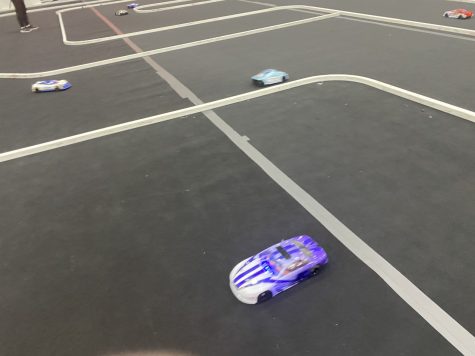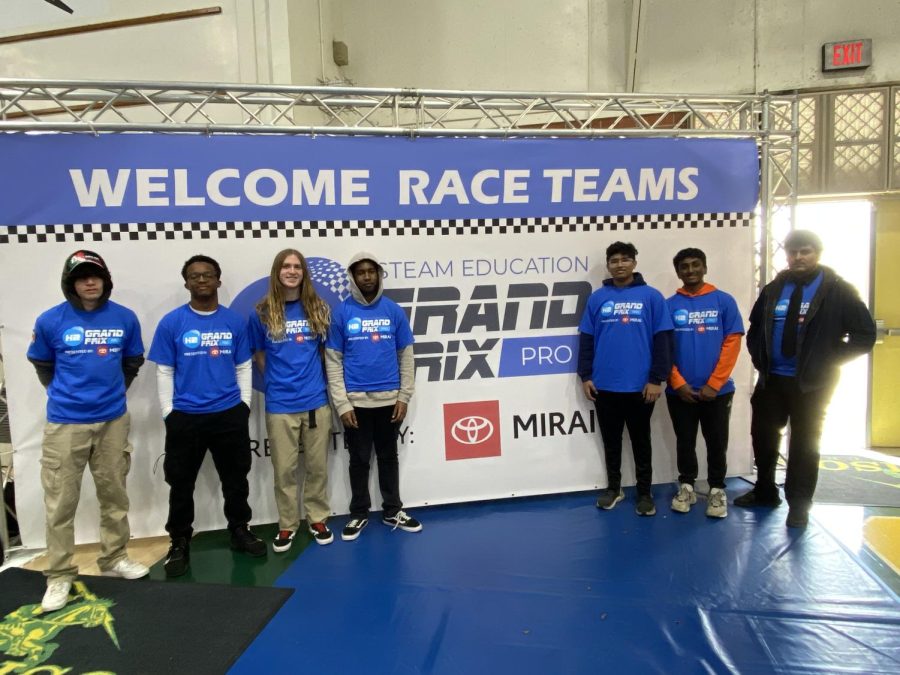AP Environmental Science races off to state
Photo courtesy: Ms. Berenice Sealy
RC car race team leaders and members placed 12th and qualified for state at the H2GP: Horizon Hydrogen Grand Prix.
Students in AP Environmental Science competed in the H2GP: Horizon Hydrogen Grand Prix on Saturday, March 4, and Sunday, March 5. Hydrogen fuel cell RC cars are remote-controlled toy cars that are powered by hydrogen fuel cells. They placed 12th out of 64 schools, which qualifies them for the state competition.
These cars are becoming increasingly popular to demonstrate the potential of hydrogen fuel cells as a clean and sustainable energy source.
Ms. Berenice Sealy, the AP Environmental Science teacher and science department chair a, serves as the school’s hydrogen fuel cell RC car coach.
Her AP environmental class participated in the race with two separate cars sponsored by Toyota and a few other smaller sponsors. It was a two-hour race.

Senior Ryan Ristic, a team leader for the race, said, “Basically, it’s an endurance race so you can see how many laps you can get in two hours nonstop.
The idea behind the H2GP is to promote and showcase the use of hydrogen as a clean and sustainable fuel source in the automotive industry, and to encourage the development of innovative technologies that can reduce carbon emissions and help combat climate change.
“The problem with hydrogen fuel cell cars is that there is no hydrogen, it’s the most abundant element on the planet but it’s always attached to something else and to separate it takes a significant amount of energy,” Sealy said. “You can separate it using electricity to separate water into hydrogen and oxygen or you can use methane gas. Both of those methods take a lot of energy and can be time-consuming.”
The state finals will take place at the Orange County Fairground on April 22. For the state competition, which is a four-hour race, Sealy said the team is making some changes to the cars.
Here are some key facts about hydrogen fuel cell RC cars:
- How it works: Hydrogen fuel cell RC cars work by converting hydrogen gas into electricity through a process called electrolysis. This electricity is then used to power the car’s electric motor.
- Advantages: Hydrogen fuel cell RC cars are environmentally friendly because they produce no harmful emissions. They also have a longer run time than traditional battery-powered RC cars.
- Challenges: Hydrogen fuel cell RC cars are more expensive than traditional battery-powered RC cars. They also require special equipment to generate and store the hydrogen fuel, which can be time-consuming.
- Availability: Hydrogen fuel cell RC cars are available from a variety of manufacturers, including Horizon Fuel Cell Technologies and H2 Energy Renaissance.
- Maintenance: Maintenance for hydrogen fuel cell RC cars is similar to traditional RC cars, but they do require periodic maintenance of the fuel cell system.
- Safety: Hydrogen is a flammable gas, so proper safety precautions should be taken when handling and storing hydrogen fuel for the car.

Bailee Small is a junior at RCHS, and this is her third year in journalism. She is the editor-in-chief for The Cat’s Eye. Her favorite thing about journalism...






